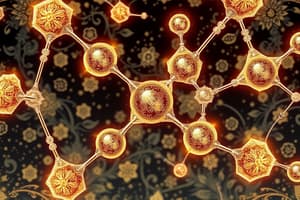Podcast
Questions and Answers
What is the focus of organic chemistry?
What is the focus of organic chemistry?
- The study of metals and their properties
- The study of rocks and minerals
- The study of carbon-based molecules (correct)
- The study of inorganic compounds
How are organic molecules classified?
How are organic molecules classified?
- By their atomic number
- By their functional groups (correct)
- By their color
- By their size
Which type of isomerism involves the spatial arrangement of atoms in a molecule?
Which type of isomerism involves the spatial arrangement of atoms in a molecule?
- Cis-trans isomers
- Optical isomers
- Geometrical isomers (correct)
- Structural isomers
What distinctive group do alcohols contain in their molecular structure?
What distinctive group do alcohols contain in their molecular structure?
In organic chemistry, what are hydrocarbons composed of?
In organic chemistry, what are hydrocarbons composed of?
What is the study of the spatial arrangement of atoms in a molecule called?
What is the study of the spatial arrangement of atoms in a molecule called?
Why is understanding reactivity patterns of organic molecules important?
Why is understanding reactivity patterns of organic molecules important?
Which field benefits from the applications of organic chemistry in developing new pharmaceutical drugs?
Which field benefits from the applications of organic chemistry in developing new pharmaceutical drugs?
In organic reactions, what are often used as catalysts to facilitate the conversion of reactants into products?
In organic reactions, what are often used as catalysts to facilitate the conversion of reactants into products?
How do organic compounds contribute to materials science?
How do organic compounds contribute to materials science?
Flashcards are hidden until you start studying
Study Notes
Exploring Organic Chemistry: The Science of Carbon-Based Molecules
Organic chemistry is a broad and fascinating field within the realm of chemistry that focuses on the study of carbon-based molecules. These molecules are found in an astonishing variety of natural products, including the building blocks of our bodies, such as proteins, DNA, and sugar. The field of organic chemistry is ever-evolving, offering endless opportunities for inquiry, discovery, and invention.
A Brief Introduction to Organic Chemistry
Organic chemistry is the study of hydrocarbons, which are compounds containing hydrogen and carbon atoms, and their derivatives. These compounds are often found in living organisms, and they can be synthesized in the laboratory for use in various applications, from pharmaceuticals to polymers and materials science.
Organic molecules are usually classified based on their functional groups, which are specific combinations of atoms that impart specific properties to the molecule. For example, alcohols have an oxygen atom bonded to a carbon atom, while aldehydes and ketones have a carbonyl group (C=O).
Key Concepts in Organic Chemistry
-
Structure: Organic molecules have a specific arrangement of atoms that determines their properties. For example, certain molecules can exist in different isomeric forms, such as cis-trans isomers or geometrical isomers. Understanding molecular structure is essential for predicting the behavior of organic molecules.
-
Stereochemistry: Stereochemistry is the study of the spatial arrangement of atoms in a molecule. In organic chemistry, this often refers to chirality, the property of having non-superimposable mirror images. Molecules that exhibit this property are called chiral, and they form the basis of many pharmaceuticals, including drugs like ibuprofen and antibiotics like penicillin.
-
Reactivity: Organic molecules have unique reactivity patterns due to their functional groups. Understanding these patterns is essential for designing synthetic pathways to synthesize new compounds and for predicting the behavior of existing compounds.
-
Mechanisms: Organic reactions are often catalyzed by transition metals or acid/base catalysts. Understanding reaction mechanisms, or the stepwise processes by which reactants are converted into products, is essential for predicting reaction outcomes and designing new syntheses.
Applications of Organic Chemistry
Organic chemistry has numerous applications across various fields.
-
Pharmaceuticals: Many pharmaceutical drugs, such as aspirin, penicillin, and ibuprofen, are organic compounds. The study of organic chemistry has led to the development of new drugs and the understanding of drug mechanisms, which has greatly improved the treatment of numerous diseases.
-
Materials Science: Organic molecules can be used to create polymers, which are long chains of repeating units. These polymers have a wide range of applications, including plastics, fibers, and coatings.
-
Environmental Science: Organic chemistry has applications in environmental science, where organic molecules are used to study pollution and contamination. For example, organic compounds can be used as biomarkers to detect environmental contaminants or as catalysts to break down dangerous chemicals.
-
Biotechnology: Organic chemistry has applications in biotechnology, where organic compounds are used in the development of new biologically active molecules, such as enzymes and antibodies.
-
Nutrition: The study of organic chemistry is essential for understanding the structure and function of nutrients, such as vitamins, sugars, and amino acids. This knowledge is important for developing foods and supplements that support human health and nutrition.
Organic chemistry is a vast and dynamic field, full of possibilities for exploration and discovery. As scientists continue to unravel the mysteries of carbon-based molecules, it is clear that organic chemistry will play an essential role in shaping our understanding of the natural world and our ability to manipulate and improve it.
Studying That Suits You
Use AI to generate personalized quizzes and flashcards to suit your learning preferences.




